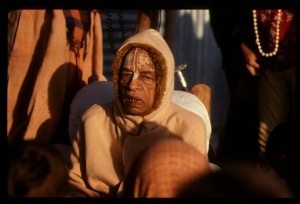SB 9.16.6: Difference between revisions
m (1 revision(s)) |
(Vanibot #0054 edit - transform synonyms into clickable links, which search similar occurrences) |
||
| (One intermediate revision by one other user not shown) | |||
| Line 1: | Line 1: | ||
{{info | {{info | ||
|speaker= | |speaker=Śukadeva Gosvāmī | ||
|listener=King | |listener=King Parīkṣit | ||
}} | }} | ||
[[Category:Srimad-Bhagavatam - Canto 09 Chapter 16|s06 ]] | |||
[[Category:Bhagavatam Verses Spoken by Sukadeva Gosvami - Vanisource|091606]] | |||
<div style="float:left">'''[[Srimad-Bhagavatam]] - [[SB 9|Ninth Canto]] - [[SB 9.16: Lord Parasurama Destroys the World's Ruling Class|Chapter 16: Lord Paraśurāma Destroys the World's Ruling Class]]'''</div> | |||
<div style="float:right">[[File:Go-previous.png|link=SB 9.16.5]] '''[[SB 9.16.5]] - [[SB 9.16.7]]''' [[File:Go-next.png|link=SB 9.16.7]]</div> | |||
{{RandomImage}} | |||
==== TEXT 6 ==== | ==== TEXT 6 ==== | ||
<div | <div class="verse"> | ||
rāmaḥ sañcoditaḥ pitrā | :rāmaḥ sañcoditaḥ pitrā | ||
bhrātṟn mātrā sahāvadhīt | :bhrātṟn mātrā sahāvadhīt | ||
prabhāva-jño muneḥ samyak | :prabhāva-jño muneḥ samyak | ||
samādhes tapasaś ca saḥ | :samādhes tapasaś ca saḥ | ||
</div> | </div> | ||
| Line 17: | Line 22: | ||
==== SYNONYMS ==== | ==== SYNONYMS ==== | ||
<div | <div class="synonyms"> | ||
''[//vanipedia.org/wiki/Special:VaniSearch?s=rāmaḥ&tab=syno_o&ds=1 rāmaḥ]'' — Lord Paraśurāma; ''[//vanipedia.org/wiki/Special:VaniSearch?s=sañcoditaḥ&tab=syno_o&ds=1 sañcoditaḥ]'' — being encouraged (to kill his mother and brothers); ''[//vanipedia.org/wiki/Special:VaniSearch?s=pitrā&tab=syno_o&ds=1 pitrā]'' — by his father; ''[//vanipedia.org/wiki/Special:VaniSearch?s=bhrātṟn&tab=syno_o&ds=1 bhrātṟn]'' — all his brothers; ''[//vanipedia.org/wiki/Special:VaniSearch?s=mātrā&tab=syno_o&ds=1 mātrā] [//vanipedia.org/wiki/Special:VaniSearch?s=saha&tab=syno_o&ds=1 saha]'' — with the mother; ''[//vanipedia.org/wiki/Special:VaniSearch?s=avadhīt&tab=syno_o&ds=1 avadhīt]'' — killed immediately; ''[//vanipedia.org/wiki/Special:VaniSearch?s=prabhāva&tab=syno_o&ds=1 prabhāva]-[//vanipedia.org/wiki/Special:VaniSearch?s=jñaḥ&tab=syno_o&ds=1 jñaḥ]'' — aware of the prowess; ''[//vanipedia.org/wiki/Special:VaniSearch?s=muneḥ&tab=syno_o&ds=1 muneḥ]'' — of the great sage; ''[//vanipedia.org/wiki/Special:VaniSearch?s=samyak&tab=syno_o&ds=1 samyak]'' — completely; ''[//vanipedia.org/wiki/Special:VaniSearch?s=samādheḥ&tab=syno_o&ds=1 samādheḥ]'' — by meditation; ''[//vanipedia.org/wiki/Special:VaniSearch?s=tapasaḥ&tab=syno_o&ds=1 tapasaḥ]'' — by austerity; ''[//vanipedia.org/wiki/Special:VaniSearch?s=ca&tab=syno_o&ds=1 ca]'' — also; ''[//vanipedia.org/wiki/Special:VaniSearch?s=saḥ&tab=syno_o&ds=1 saḥ]'' — he. | |||
</div> | </div> | ||
| Line 24: | Line 29: | ||
==== TRANSLATION ==== | ==== TRANSLATION ==== | ||
<div | <div class="translation"> | ||
Jamadagni then ordered his youngest son, Paraśurāma, to kill his brothers, who had disobeyed this order, and his mother, who had mentally committed adultery. Lord Paraśurāma, knowing the power of his father, who was practiced in meditation and austerity, killed his mother and brothers immediately. | Jamadagni then ordered his youngest son, Paraśurāma, to kill his brothers, who had disobeyed this order, and his mother, who had mentally committed adultery. Lord Paraśurāma, knowing the power of his father, who was practiced in meditation and austerity, killed his mother and brothers immediately. | ||
</div> | </div> | ||
| Line 31: | Line 36: | ||
==== PURPORT ==== | ==== PURPORT ==== | ||
<div | <div class="purport"> | ||
The word prabhāva jñaḥ is significant. Paraśurāma knew the prowess of his father, and therefore he agreed to carry out his father's order. He thought that if he refused to carry out the order he would be cursed, but if he carried it out his father would be pleased, and when his father was pleased, Paraśurāma would ask the benediction of having his mother and brothers brought back to life. Paraśurāma was confident in this regard, and therefore he agreed to kill his mother and brothers. | The word ''prabhāva jñaḥ'' is significant. Paraśurāma knew the prowess of his father, and therefore he agreed to carry out his father's order. He thought that if he refused to carry out the order he would be cursed, but if he carried it out his father would be pleased, and when his father was pleased, Paraśurāma would ask the benediction of having his mother and brothers brought back to life. Paraśurāma was confident in this regard, and therefore he agreed to kill his mother and brothers. | ||
</div> | </div> | ||
__NOTOC__ | |||
<div style="float:right; clear:both;">[[File:Go-previous.png|link=SB 9.16.5]] '''[[SB 9.16.5]] - [[SB 9.16.7]]''' [[File:Go-next.png|link=SB 9.16.7]]</div> | |||
__NOTOC__ | |||
__NOEDITSECTION__ | |||
Latest revision as of 23:46, 18 February 2024

A.C. Bhaktivedanta Swami Prabhupada
TEXT 6
- rāmaḥ sañcoditaḥ pitrā
- bhrātṟn mātrā sahāvadhīt
- prabhāva-jño muneḥ samyak
- samādhes tapasaś ca saḥ
SYNONYMS
rāmaḥ — Lord Paraśurāma; sañcoditaḥ — being encouraged (to kill his mother and brothers); pitrā — by his father; bhrātṟn — all his brothers; mātrā saha — with the mother; avadhīt — killed immediately; prabhāva-jñaḥ — aware of the prowess; muneḥ — of the great sage; samyak — completely; samādheḥ — by meditation; tapasaḥ — by austerity; ca — also; saḥ — he.
TRANSLATION
Jamadagni then ordered his youngest son, Paraśurāma, to kill his brothers, who had disobeyed this order, and his mother, who had mentally committed adultery. Lord Paraśurāma, knowing the power of his father, who was practiced in meditation and austerity, killed his mother and brothers immediately.
PURPORT
The word prabhāva jñaḥ is significant. Paraśurāma knew the prowess of his father, and therefore he agreed to carry out his father's order. He thought that if he refused to carry out the order he would be cursed, but if he carried it out his father would be pleased, and when his father was pleased, Paraśurāma would ask the benediction of having his mother and brothers brought back to life. Paraśurāma was confident in this regard, and therefore he agreed to kill his mother and brothers.